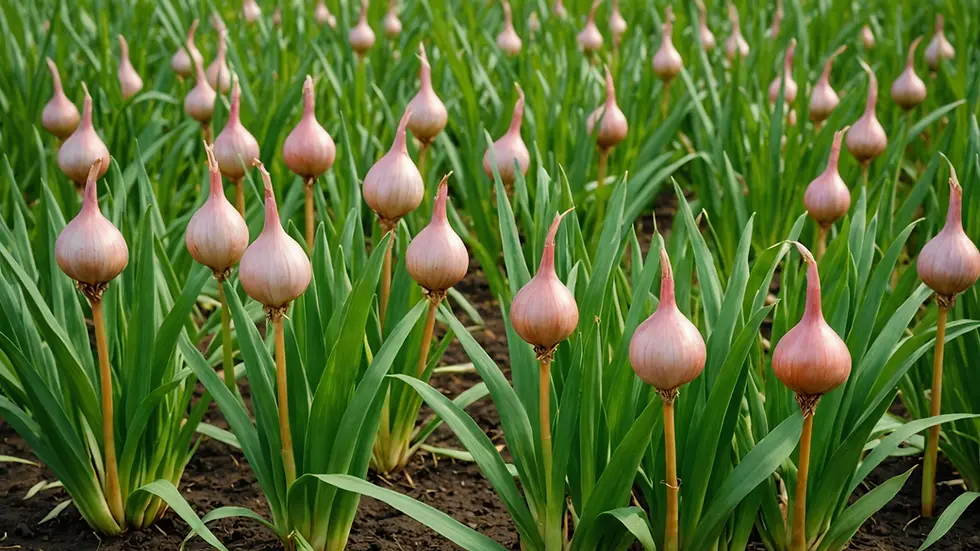The Untold Benefits of Pesticide Use for Shallot Cultivation: A Professional Guide
- Nicole Katama
- Feb 3, 2025
- 3 min read
Shallots are a unique and flavorful ingredient in countless dishes worldwide. They belong to the onion family and are celebrated for their distinct taste and numerous health benefits. However, cultivating shallots can be tricky, especially if you're looking to ensure a plentiful harvest. One vital resource for shallot farmers is the careful use of pesticides. By understanding and applying pesticides wisely, growers can significantly enhance their yield and plant health.
This article explores the many advantages of using pesticides in shallot farming while addressing common concerns regarding their use.
Understanding Pesticides
Pesticides are substances designed to prevent, control, or eliminate pests that threaten crops. They come in various forms, including insecticides, herbicides, and fungicides. Each type targets specific problems within shallot farming.
Even though pesticides often raise questions about safety and environmental effects, they remain essential in modern agriculture. For example, according to the U.S. Environmental Protection Agency (EPA), pesticide use has helped increase crop yields by over 20% in specific regions, underscoring their role in boosting agricultural productivity.
Pest Control: A Key to Healthy Crops
Effective pest control is one of the main advantages of using pesticides in shallot farming. Shallots are susceptible to various pests, including aphids, thrips, and onion maggots. These pests can cause significant damage, potentially killing the plants and leading to substantial losses.
For instance, a study found that onion maggots could reduce yields by up to 50% if not managed effectively. By applying suitable pesticides, farmers can significantly reduce the pest threat, resulting in healthier crops and more sustainable farming practices.
Prevention of Disease
Shallots also face threats from various diseases, such as downy mildew and gray mold, which can devastate entire crops. The use of fungicides is crucial for preventing these diseases.
Research shows that early intervention with fungicides can reduce disease incidence by over 30%. By monitoring crops and acting swiftly with fungicides, farmers can secure a healthier harvest and lower the risks associated with crop infections.
Improved Yields and Quality
Smart pesticide usage can lead to improved yields. Healthy shallot plants, free from pests and diseases, produce more bulbs. This not only means more crops for sale but also increases profitability.
Data indicates that farms practicing effective pest management can see yield increases of 15-25%. Additionally, pesticides can enhance the quality of harvested shallots. Well-managed crops tend to be larger, more uniform, and better tasting. This quality translates into stronger market demand and higher prices. For example, quality shallots often sell for 30% more in premium markets.
Reduced Competition from Weeds
Weeds in shallot fields vie for nutrients, water, and sunlight, stunting growth. Herbicides help control weed populations, allowing shallots to flourish without competition.
Using herbicides significantly reduces the need for manual weeding, saving time and labor costs. A large shallot farm could cut labor costs by over 40%, making herbicide use a financially beneficial choice for many growers.
Enhanced Economic Viability
The economic viability of shallot farming greatly improves with responsible pesticide use. Increased yields and reduced labor costs lead to better profit margins. According to agricultural studies, farmers can experience profit margins grow by as much as 20% through effective pest control.
Additionally, maintaining high quality and consistent supply helps stabilize market prices. When farmers can provide a reliable, quality product, they mitigate the fluctuations often seen in agricultural pricing.
Environmental Considerations
While the benefits of pesticides are clear, responsible use is essential. Integrated pest management (IPM) combines chemical, biological, and cultural practices to reduce environmental impacts.
Farmers should choose pesticides tailored specifically for their crops. This targeted application protects the beneficial organisms in the ecosystem, ensuring a healthier environment for future growth.
Regulatory Compliance and Safety
Pesticide use is regulated by governmental bodies to protect consumers, the environment, and agricultural workers. It is vital for shallot farmers to adhere to these regulations, including proper handling, application, and disposal of pesticides.
By keeping informed about guidelines and best practices, growers can safeguard themselves and support long-term farming sustainability.
Final Thoughts
The role of pesticides in shallot cultivation is significant. From effective pest and disease management to improved yields and quality, pesticides provide numerous advantages. By employing best practices and adopting an integrated pest management approach, farmers can leverage these benefits while considering environmental impacts.
When used responsibly, pesticides empower shallot growers to produce robust crops efficiently. This understanding is crucial to meeting market demands and securing economic success, all while continuing to provide high-quality produce for consumers.



Comments